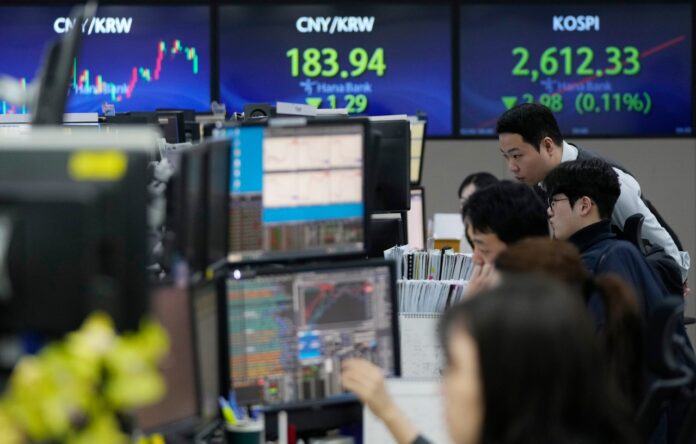Zimo Zhong, Associated Press
23 minutes ago
Currency traders watch screens near screens displaying the Korea Composite Stock Price Index (KOSPI), right, in the foreign exchange trading room at the headquarters of KEB Hana Bank in Seoul, South Korea, Monday, February 5, 2024. Asian stocks were mostly lower. China on Monday, as Chinese stocks led declines again even after the market regulator in Beijing pledged to crack down on abuses and protect small investors. (AP Photo/Ahn Young Joon)
HONG KONG (AP) — Asian shares mostly fell Monday, with Chinese stocks again leading declines even after Beijing’s market regulator pledged to crack down on abuses and protect small investors.
The main index in the smaller market in Shenzhen fell 5.4% but then quickly recovered to trade 1.7% lower. The Shanghai Composite Index fell by more than 2% before recovering some of its losses.
US futures fell and oil prices rose.
The China Securities Regulatory Commission said on Sunday it would double enforcement of measures against crimes such as market manipulation and malicious short selling, while directing more medium- and long-term funds into the market.
This move came on the heels of other moves in recent days that did not seem to do much to reassure investors who have been withdrawing their money from the markets for months. Last week, Chinese stocks had their worst week in five years.
Former President Donald Trump’s comments said he could impose tariffs of more than 60% on imports of Chinese goods if re-elected, which also hurt market sentiment. In another blow, a report said China’s services sector grew at a slightly slower rate in January, with the Purchasing Managers’ Index falling to 52.7 from 52.9 in December, according to a private sector survey on Monday. A PMI above 50 indicates expansion compared to the previous month.
By mid-afternoon Monday, the Shanghai Composite Index was down 0.2% to 2,725.54. The Hang Seng Index in Hong Kong rose 0.6% to 15,630.63 points.
Elsewhere in Asia, the Nikkei 225 in Tokyo rose 0.6% to 36,390.31.
Australia’s S&P/ASX 200 index fell 1% to 7,623.30. South Korea’s Kospi index fell 0.6% to 2599.62.
On Friday, big technology stocks lifted Wall Street back to a record high, though the majority of stocks fell on renewed concerns about the risks of a hot economy.
Big gains by Meta Platforms and Amazon helped push the S&P 500 up 1.1% to close at 4,958.61. It is in hot form having been up in 13 of the last 14 weeks. Big Tech stocks, two of the most influential stocks on Wall Street, and the Nasdaq Composite Index rose 1.7%.
But the Dow Jones Industrial Average, which focuses less on technology, rose a more modest 0.3% to 38,654.42. The Nasdaq index jumped 1.7% to 15,628.95.
Stocks felt pressure from much higher yields in the bond market after a report showed that US employers hired more workers last month than economists expected.
This is great for workers and helps keep the risk of a recession at bay, but it could keep some upward pressure on inflation and lead the Fed to wait longer before it starts cutting interest rates.
Hopes for such cuts, which could ease pressure on the economy and raise investment prices, were a major reason why the US stock market rose to record levels. Federal Reserve Chairman Jerome Powell said earlier this week that cuts were unlikely to begin as soon as traders had hoped.
The jobs report hit Wall Street amid a storm of earnings reports.
Meta Platforms shares, which owns Facebook and Instagram, rose 20.3% after it announced stronger-than-expected profits in the fourth quarter and said it would begin distributing dividends to its investors.
Amazon shares rose 7.9% after it announced stronger-than-expected profits and revenues in the fourth quarter.
Both are members of a small group of big tech stocks known as the “Big Seven” that are responsible for the majority of Wall Street stocks hitting a record high. Their huge gains have led to them setting very high expectations for their growth, which they need to achieve to justify the huge rise in their stock prices.
Apple, another member of the Magnificent Seven, fell 0.5% even though it reported better-than-expected earnings.
Charter Communications stock fell 16.5% for the biggest loss in the S&P 500 after it reported weaker-than-expected earnings last quarter.
In other trading, the price of benchmark US crude rose 39 cents to $72.67 a barrel in electronic trading on the New York Mercantile Exchange. Brent crude, the international standard, rose 52 cents to $77.85 a barrel.
The US dollar fell to 148.38 Japanese yen from 148.43 yen. The price of the euro reached $1.0779, down from $1.0784.
#STOCK #MARKET #TODAY #Asian #stocks #fall #Chinese #stocks #slide #moves #markets


































